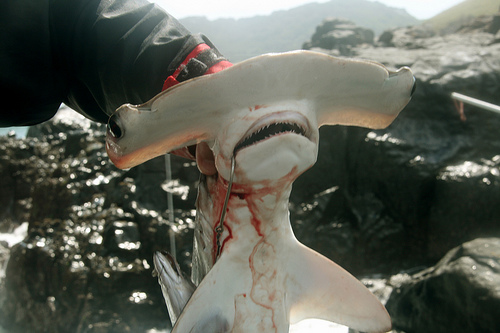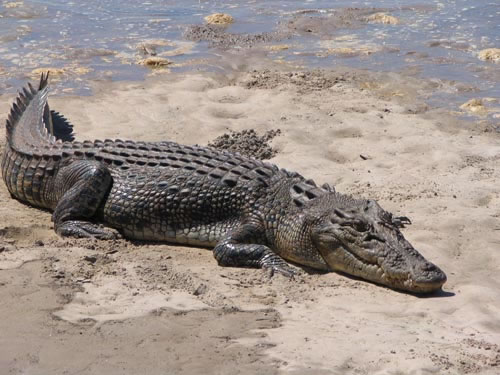There is a predator on the prowl around ocean waters. With a keen sense that has been honed from years of living around the marine environment, the predator looks for its prey and spreads the fearsome net of death. The prey is grabbed, hauled, a precious body part ripped apart while it is still alive, and thrown back mercilessly into the waters. Whether the prey lives or dies post this brutal attack, is not the predator’s concern, for the prize is already in his hand – the fin of the Shark.
Worldwide, sharks are being killed at the rate of a 100 million every year. And yes that is a million times more than the 100 odd cases of shark attacks on humans reported annually. It is not really our exaggerated fear of sharks that should be the world’s concern, but the way these ocean mammals are being chopped, cut and left to die a slow death by our fellow brethrens for a mere 2 percent of a shark’s body part.
Now Indian government, has taken a strong stand against the brutal killing, and banned shark finning on its shores.
Profit in a Soup
Most Indian fishermen catch shark for their meat. But the finning industry proves much more lucrative with exports to China. A single fin can fetch them thousands of dollars thanks to the hugely popular shark fin soup. Though illegal in most countries shark fin soup is sold upwards of $100 per bowl. From boosting sexual potency to enhancing skin quality, the health benefits woven around the exotic dish, makes for a tempting treat. The cartilaginous rays from the sharks’ fins add almost no flavor to the concoction. But demand for the fins has lead to the overfishing of many sharks.

Sadly, for the sharks, without the fin, survival in oceans and seas is next to impossible. And being the ultimate predators of the marine environment, their decline in the water world, means threat to all other life forms from fishes to eels to turtles and aquatic plants.
Additionally, sharks are very slow to mature and reproduce. So an adult shark killed today, can virtually wipe out the entire population of the species in matter of few years or even months.
Why India’s Ban Matters
India lists several of the dozens of shark species in its waters as endangered, including hammerheads, broadfins and whale sharks. Sadly it is the attraction of shark towards Indian shorelines that has also become their death trap.
Till date, India has been the world’s second-largest shark-catching nation behind Indonesia.
With the two countries accounting for 20 per cent of yearly shark catches, according to a report by the international wildlife trade monitoring agency TRAFFIC, the world ranking is certainly not something any Indian can be proud of.
TRAFFIC report states,
The Top 20 shark catchers in descending order are Indonesia, India, Spain, Taiwan, Argentina, Mexico, United States of America, Malaysia, Pakistan, Brazil, Japan, France, New Zealand, Thailand, Portugal, Nigeria, Islamic Republic of Iran, Sri Lanka, Republic of Korea and Yemen, who between them account for nearly 80 percent of the total shark catch reported globally, with Indonesia and India alone responsible for over 20% of global catches between 2002 and 2011.
Three EU Member States – Spain, France and Portugal – are among the top 20 shark catchers, responsible for 12% of global catches and, collectively, the 28 EU Member States are the largest shark catching entity of all.
From – http://www.traffic.org/home/2013/7/30/new-study-gets-its-teeth-into-shark-trade-regulations.html
The ban therefore, is a move that can surely go a long way in saving sharks.
Shark finning is already illegal in 98 countries including Australia, the United States, Canada, South Africa, Mexico, Brazil, the European Union, Guam, Guatemala and Belize. With India backing the ban, the trade in shark fin may see a visible dip.
Under the Environment Ministry’s new policy, fishermen now found with hauls including detached fins risk up to seven years in prison for hunting an endangered species since identifying species by fins alone is difficult.
India’s Marine Products Export Development Authority data shows that last year, Indian fishermen exported 4.8 million USD in shark fins to China. This was less than half of the 11.3 million USD in 2010 showing that the trade diminished in two years, despite rising demand. Fisherman state that the reduced export was due to the less catch in Indian waters which itself is a strong proof that shark numbers have already plummeted and the ban is just in time to save what can be still saved.

Applauding the environment ministry’s move, C. Samyukta, wildlife campaign manager for HSI/India said,
“We are overjoyed at India’s decision to adopt a fins naturally attached policy, which experts worldwide agree is necessary to protect sharks from the cruelty of finning. Humane Society International has been campaigning hard to see this policy enacted, and we are delighted authorities have taken this crucial step.”
India’s new ‘fin naturally attached policy’ is an urgent and commendable effort towards the conservation of these mega predators. The misunderstood kings of the oceans world may finally stop landing in a soup.
More Related Stories,
Jeff’s Explorer Series: Sharks
India Second in the List of Shark catching Nations
Image via cc/Flickr by Steve Garner, Fraiser Cairns, Jason Robert Shaw







4 thoughts on “India Ends Brutal Slicing of Shark Fins: Why it Matters”